| Srl | Item |
| 1 |
ID:
174015
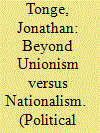

|
|
|
|
|
| Summary/Abstract |
Northern Ireland has always been a polity noted for its strong links between national identity, religion, and voting, and acute British unionist versus Irish nationalist divisions. The constitutional question of whether Northern Ireland should be part of the UK or a united Ireland dominates. Yet, recent surveys have suggested a sizeable and growing section of its electorate declares itself neither unionist nor nationalist. This development may have assisted the growth of the centrist Alliance Party, which rejects unionist and nationalist identities and claims to be neutral on Northern Ireland’s constitutional status. Alliance doubled its vote across three elections in 2019 and is now the third largest party in the region. This article examines the importance of ideological dealignment relative to other factors, such as Alliance’s opposition to Brexit, in explaining the rise of a non‐binary party in a divided society.
|
|
|
|
|
|
|
|
|
|
|
|
|
|
|
|
| 2 |
ID:
160641
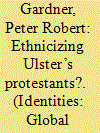

|
|
|
|
|
| Summary/Abstract |
The Ulster-Scots ethnolinguistic ‘revival,’ often considered to be the ethnic, cultural or linguistic expression of unionism and loyalism, has recently made inroads into schools across Northern Ireland. With intercommunal educational segregation pervasive in the province, the teaching of such an ‘ethnic identity’ has potential sociological ramifications. Utilizing an in-depth textual analysis of the Ulster-Scots Agency’s educational materials and interviews with educationalists and political elites, I contend that although this ethnicization represents a break of sorts with traditional unionist-loyalist ideas rather than an unproblematic reinforcement of them, it holds considerable potential for the deepening of normative senses of communal difference.
|
|
|
|
|
|
|
|
|
|
|
|
|
|
|
|
| 3 |
ID:
153296


|
|
|
|
|
| Summary/Abstract |
The 2016 Northern Ireland Assembly election highlighted substantive issues within nationalism. Both the main nationalist parties, the Social Democratic and Labour Party (SDLP) and Sinn Féin, recorded the worst combined vote for over 20 years. This article suggests that the downturn in nationalist support was years in the making and examines why nationalist voters might be turning away from the ballot box. It considers the various factors that underlined both parties' approach to consecutive electoral tests from 1998 until 2016, showing how Sinn Féin replaced the SDLP as the leading force within nationalism, and concluding that new leadership may yet halt the process of orderly decline.
|
|
|
|
|
|
|
|
|
|
|
|
|
|
|
|
| 4 |
ID:
153653


|
|
|
|
|
| Summary/Abstract |
Current discourses in education circles are on the professional status of the teaching profession due to teachers’ continued involvement in labour protests. This paper discusses whether teachers may still be considered as professionals or workers. There is an assumption that if formulated policies reflect on alleviating the plight and actual conditions in which teachers work, strikes can be halted resulting in quality teaching and learning in schools. A literature review was conducted to seek solutions to this impasse. It is expected that with insight into the actual teachers’ working conditions by policymakers, barriers that lead to endless labour protests may be alleviated to restore professionalism in teaching.
|
|
|
|
|
|
|
|
|
|
|
|
|
|
|
|
| 5 |
ID:
112064
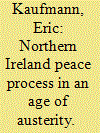

|
|
|
|
|
| Publication |
2012.
|
| Summary/Abstract |
The steady drip of dissident Republican attacks forms the backdrop to this special issue of Political Quarterly. Moreover, this comes at a time of economic austerity, when Northern Ireland faces unprecedented cuts to its public sector-dominated economy. The economic crisis in the South adds an additional layer of uncertainty to the picture. In the past, economic deprivation has been associated with conflict in Northern Ireland and elsewhere. Might the peace dividend and constitutional settlement which have underpinned the Northern Ireland 'miracle' since 1994 be under threat? Or is there now sufficient momentum in both of Northern Ireland's main ethnic communities that such an outcome can be safely averted? This paper summarises the thinking of our symposium and special issue on this topic, updating our picture of the Northern Ireland peace process.
|
|
|
|
|
|
|
|
|
|
|
|
|
|
|
|
| 6 |
ID:
112070
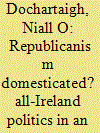

|
|
|
|
|
| Publication |
2012.
|
| Summary/Abstract |
This paper examines some of the key factors working in favour of mutual insulation between the two political jurisdictions in Ireland, factors that contribute to the 'copper-fastening' of partition and that constitute a major obstacle to any Irish Republican project focused on the ending of partition. It outlines the powerful structural forces working for the naturalisation of Northern Ireland as a political unit. It argues that some of these factors are almost entirely independent of political unionism and in certain respects work to copperfasten partition despite the efforts of unionism. It goes on to outline a number of key elements that work against the mutual insulation of the jurisdictions and the domestication of Irish Republican and nationalist politics in a Northern Ireland context, factors that continue to pull the North back into an all-Ireland context despite all of the powerful structural factors working to mutually insulate the politics of the two jurisdictions.
|
|
|
|
|
|
|
|
|
|
|
|
|
|
|
|
| 7 |
ID:
053260
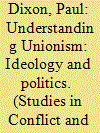

|
|
|